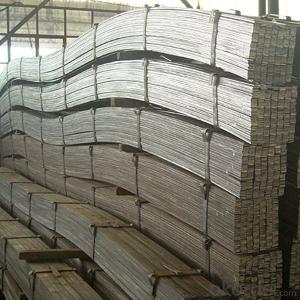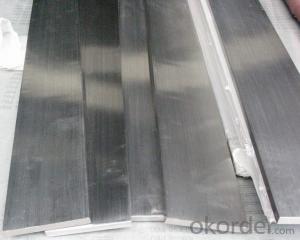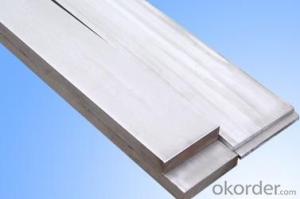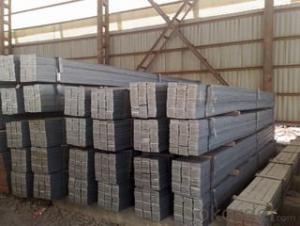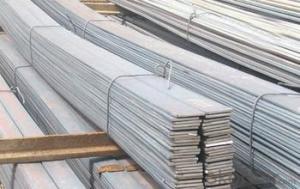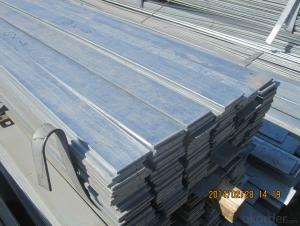Grade AISI D2 Hot Rolled Steel Flat Bar with Low Price
- Loading Port:
- Tianjin
- Payment Terms:
- TT OR LC
- Min Order Qty:
- 3 m.t.
- Supply Capability:
- 10000 m.t./month
OKorder Service Pledge
OKorder Financial Service
You Might Also Like
Item specifice
Grade AISI D2 Hot Rolled Steel Flat Bar with Low Price
Specification of Grade AISI D2 Hot Rolled Steel Flat Bar with Low Price
Grades | GB | DIN | AISI | JIS | OTHERS | |||||
Cr12Mo1V1 | 1.2379 | D2 | SKD11 | K110 | ||||||
X155CrVMo12-1 | ||||||||||
Chemical composition | C | Si | Mn | Cr | P | S | Mo | V | ||
1.50-1.60 | 0.10-0.40 | 0.15-0.45 | 11.50-12.50 | 0.03MAX | 0.03MAX | 0.60-0.80 | 0.90-1.10 | |||
Available | Round Bar | Diameter | Length | |||||||
10-380mm | 2000-5800mm | |||||||||
Flat Bar | Thickness | Width | Length | |||||||
12-500mm | 60-900mm | 2000-5800mm | ||||||||
Surface condition | Black surface/ Milled | |||||||||
Annealed hardness | HB250MAX | |||||||||
Characteristics | Very high resistance against abrasive and adhesive wear due to a high volume of hard carbides in the steel matrix moderate machinability good dimensional stability, toughness and through hardenability | |||||||||
Applications | cutting, punching, stamping tools | |||||||||
Shear blades | ||||||||||
Thread rolling dies | ||||||||||
Drawing and bending tools | ||||||||||
Flanging and straightening rolls | ||||||||||
Fine cutting tools | ||||||||||
Deep drawing tools | ||||||||||
Plastic mould for abrasive polymers | ||||||||||
Cold extrusion dies | ||||||||||
Drawing dies | ||||||||||
CNBM Introduction of Grade AISI D2 Hot Rolled Steel Flat Bar with Low Price
CNBM International Corporation is the most import and export platform of CNBM group(China National Building Material Group Corporation) ,which is a state-owned enterprise, ranked in 270th of Fortune Global 500 in 2015.
With its advantages, CNBM International are mainly concentrate on Cement, Glass, Iron and Steel, Ceramics industries and devotes herself for supplying high quality series of refractories as well as technical consultancies and logistics solution.
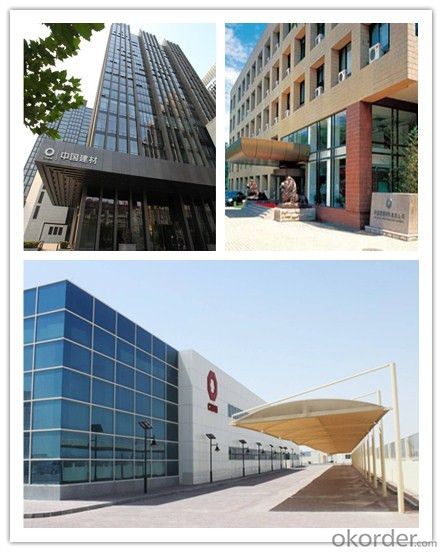
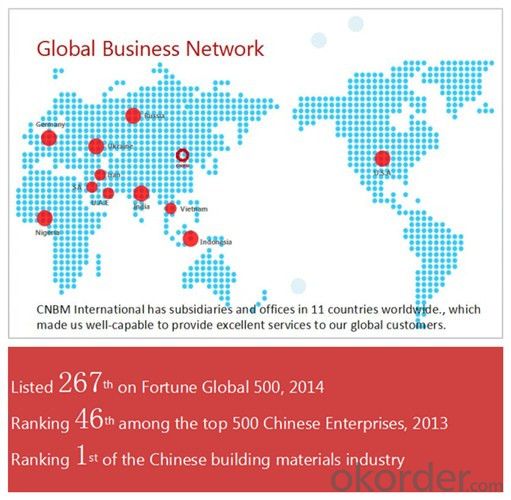
After-sale service |
|
Advantages
|
|
Packaging & Delivery of Grade AISI D2 Hot Rolled Steel Flat Bar with Low Price
Packaging Detail | Sea worthy packing /as per customer's packing instruction |
Delivery Detail | 15 ~ 40 days after receiving the deposit |
Products Show
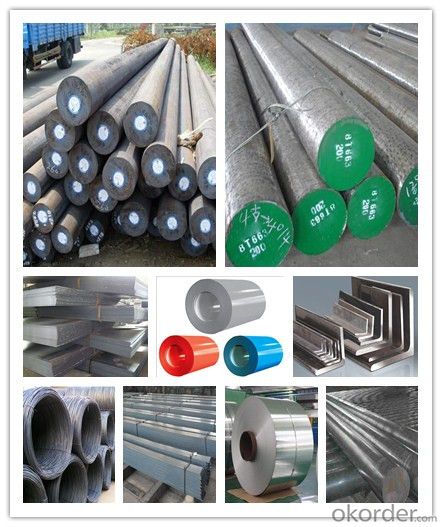
FAQ:
Are you a trading company or manufacturer? | Manufacturer |
What’s the MOQ? | 3 metric ton |
What’s your delivery time? | 15-35 days after downpayment received |
Do you Accept OEM service? | Yes |
what’s your delivery terms? | FOB/CFR/CIF |
What's the Payment Terms? | 30% as deposit,70% before shipment by T/T |
Western Union acceptable for small amount. | |
L/C acceptable for large amount. | |
Scrow ,Paybal,Alipay are also ok | |
Why choose us? | Chose happens because of quality, then price, We can give you both. Additionally, we can also offer professional products inquiry, products knowledge train (for agents), smooth goods delivery, excellent customer solution proposals. |
What's your available port of Shipment? | Main Port, China |
What’s your featured services? | Our service formula: good quality+ good price+ good service=customer's trust
|
Where are your Market? | Covering more than 160 countries in the world |
- Q:How is special steel used in the manufacturing of cutting tools?
- Special steel is used in the manufacturing of cutting tools because of its high hardness, toughness, and wear resistance. This type of steel can be heat-treated to achieve the desired hardness and can retain its cutting edge for a longer period. It is commonly used in the production of drills, saw blades, and milling cutters to ensure efficient and precise cutting operations.
- Q:How does special steel contribute to the chemical processing aftermarket industry?
- Special steel plays a crucial role in the chemical processing aftermarket industry by offering a wide range of benefits that enhance the overall efficiency and performance of chemical processing equipment. Firstly, special steel is renowned for its exceptional strength and durability, making it ideal for applications that involve high pressure, extreme temperatures, and corrosive environments. This durability ensures that the equipment can withstand the challenging conditions and operate reliably for extended periods, reducing the frequency of maintenance and replacement. Furthermore, special steel possesses excellent resistance to corrosion, oxidation, and chemical reactions, which are common challenges in the chemical processing industry. This resistance enables the equipment to handle a wide variety of chemicals without deteriorating or contaminating the process, thus ensuring the quality and safety of the end products. Additionally, special steel can withstand the formation of scale, deposits, and other contaminants that can hinder the efficiency of the equipment, thereby reducing the need for frequent cleaning and maintenance. Moreover, special steel offers superior mechanical properties such as toughness, hardness, and impact resistance, which are essential for handling and processing heavy loads and abrasive materials. This ensures that the equipment can withstand the demanding operational conditions and maintain its performance over time, resulting in enhanced productivity and reduced downtime. Another significant contribution of special steel to the chemical processing aftermarket industry is its versatility. It can be customized and tailored to meet specific requirements, allowing for the manufacturing of complex parts and components that are essential for various chemical processes. Special steel can be fabricated into different shapes and sizes, enabling the creation of intricate designs and structures that optimize the efficiency and effectiveness of the equipment. In conclusion, special steel is a vital component in the chemical processing aftermarket industry due to its exceptional strength, durability, resistance to corrosion and chemical reactions, as well as its versatility. By providing reliable and high-performance equipment, special steel contributes significantly to the overall efficiency, safety, and productivity of chemical processing operations.
- Q:How does special steel contribute to the robotics industry?
- Special steel plays a crucial role in advancing the robotics industry in multiple ways. Firstly, special steel alloys possess exceptional mechanical properties, making them ideal for manufacturing various robotic components. These alloys can provide superior strength, durability, and resistance to wear and tear. As a result, robots built with special steel can operate efficiently and reliably in demanding environments, such as manufacturing plants or hazardous locations. Moreover, special steel alloys offer excellent heat resistance and thermal stability. This characteristic is particularly important in the robotics industry, as robots often generate significant heat during operations. Special steel components can withstand high temperatures without deforming or losing their structural integrity. This capability ensures that robots can operate at their optimal performance levels without the risk of mechanical failures caused by heat-related issues. Additionally, special steel's corrosion resistance is highly beneficial for the robotics industry. Robots are increasingly being deployed in diverse applications, including underwater exploration, chemical handling, and outdoor environments. In such cases, exposure to moisture, chemicals, or harsh weather conditions can lead to corrosion and degradation of robot parts. By utilizing special steel alloys, manufacturers can significantly extend the lifespan of robotic systems, reducing maintenance costs and enhancing their overall reliability. Furthermore, special steel's magnetic properties make it invaluable in the development of magnetic sensors and actuators used in robotics. These sensors enable robots to detect and interact with their surroundings, enhancing their autonomy and adaptability. Magnetic actuators, on the other hand, enable precise control and movement in robotic systems. Special steel's magnetic properties contribute to the efficiency, accuracy, and responsiveness of these components, enabling robots to execute complex tasks with precision. Overall, special steel plays an integral role in the robotics industry by providing the necessary materials for manufacturing robust, high-performance, and versatile robotic systems. From enhancing strength and durability to withstanding extreme conditions, special steel alloys contribute to the advancement of robotics by ensuring the reliability, efficiency, and functionality of these machines.
- Q:What are the different methods for improving the impact resistance of special steel?
- There are several methods available for improving the impact resistance of special steel. These methods can be broadly categorized into heat treatment, alloying, and surface treatments. 1. Heat Treatment: One of the most common methods for improving impact resistance is heat treatment. This involves subjecting the steel to controlled heating and cooling processes to alter its microstructure. The two main heat treatment processes used for improving impact resistance are tempering and quenching. Tempering involves heating the steel to a specific temperature and then cooling it slowly. This process helps to relieve internal stresses and improve toughness. Quenching, on the other hand, involves rapidly cooling the steel after heating it to a high temperature. This process results in a hardened microstructure, enhancing the impact resistance. 2. Alloying: Another method for improving the impact resistance of special steel is through alloying. By adding certain elements to the base steel, the properties can be enhanced. For example, adding elements such as manganese, nickel, or chromium can improve the toughness and impact resistance of the steel. These alloying elements alter the steel's microstructure, resulting in increased strength and resistance to deformation. 3. Surface Treatments: Surface treatments are used to improve the impact resistance of special steel by providing a protective layer on the surface. One commonly used surface treatment is case hardening, which involves introducing carbon or nitrogen into the surface layer of the steel. This process creates a hard outer layer while retaining a tough core, enhancing the impact resistance. Another surface treatment method is shot peening, which involves bombarding the steel surface with small metal or ceramic particles under high pressure. This process induces compressive stresses in the surface layer, improving the fatigue resistance and impact resistance of the steel. In conclusion, the different methods for improving the impact resistance of special steel include heat treatment, alloying, and surface treatments. These methods can be employed individually or in combination to enhance the mechanical properties of the steel, making it more resistant to impact and deformation.
- Q:How is martensitic steel used in knife making?
- Martensitic steel is commonly used in knife making due to its high hardness and excellent edge retention properties. Its ability to be heat treated and tempered makes it ideal for creating sharp and durable knife blades. The steel's fine grain structure allows for precise and detailed work, resulting in high-quality and long-lasting knives.
- Q:How does special steel contribute to the pharmaceutical industry?
- Special steel plays a crucial role in the pharmaceutical industry by offering exceptional strength, corrosion resistance, and durability. It is used in the manufacturing of various equipment and components such as storage tanks, reactors, piping systems, and precision instruments. The unique properties of special steel ensure the integrity and purity of pharmaceutical products, prevent contamination, and enable efficient and safe production processes.
- Q:How does special steel contribute to weight reduction in manufacturing?
- Special steel, engineered specifically for various manufacturing applications, possesses certain characteristics that make it suitable. One major advantage of special steel is its ability to reduce weight in manufacturing processes. Industries that prioritize weight reduction, such as automotive, aerospace, and construction, often utilize special steel. This is because special steel has a high strength-to-weight ratio, meaning it can provide the necessary strength and performance while being lighter compared to other materials. Using special steel allows companies to achieve weight reduction in multiple ways. Firstly, the lightweight nature of special steel enables the production of significantly lighter components and structures compared to conventional materials. This reduction in weight offers several benefits, including improved fuel efficiency in automobiles, increased payload capacity in aircraft, and easier handling and installation in construction projects. Moreover, special steel's high strength-to-weight ratio allows manufacturers to design and produce thinner yet equally strong components. This not only reduces overall weight but also optimizes material usage, leading to cost savings and a more sustainable manufacturing process. Additionally, special steel's unique properties, such as excellent formability and weldability, facilitate the creation of complex and intricate designs that further contribute to weight reduction. This versatility enables the production of lightweight components with intricate shapes and structures, enhancing overall performance and functionality. In conclusion, special steel is crucial in reducing weight during manufacturing processes. Its high strength-to-weight ratio, lightweight nature, excellent formability, and weldability enable the production of lighter components and structures. By utilizing special steel, industries can achieve improved efficiency, performance, and sustainability in their manufacturing operations.
- Q:How is special steel used in the production of engine components?
- Special steel is used in the production of engine components due to its superior strength, durability, and heat resistance properties. It is commonly utilized to manufacture critical parts such as crankshafts, connecting rods, camshafts, valves, and piston rings. The high strength of special steel allows these engine components to withstand the extreme forces and temperatures experienced during engine operation, ensuring optimal performance and longevity of the engine.
- Q:What are the challenges in welding special steel alloys?
- Welding special steel alloys poses several challenges due to their unique properties and composition. Some of the main challenges in welding special steel alloys include: 1. High melting point: Special steel alloys often have higher melting points compared to regular steel, which requires higher heat input during the welding process. This can result in difficulties in achieving proper fusion and may require specialized welding equipment and techniques. 2. Thermal expansion mismatch: Special steel alloys may have different coefficients of thermal expansion compared to the base metal or other materials being joined. This can lead to the formation of stress and distortion during welding, which can affect the structural integrity of the welded joints. 3. Sensitivity to heat: Certain special steel alloys are more susceptible to heat-affected zone (HAZ) cracking and other forms of weld defects. The high heat input during welding can cause the formation of brittle phases or precipitates, leading to reduced mechanical properties and potential weld failures. 4. Metallurgical changes: Welding special steel alloys can result in significant metallurgical changes in the base metal and the heat-affected zone. These changes include the formation of new microstructures, changes in hardness, and variations in the chemical composition. These alterations can impact the overall performance and properties of the welded joints. 5. Pre-weld and post-weld treatments: Special steel alloys often require specific pre-weld and post-weld treatments to minimize the risk of weld defects and optimize the properties of the welded joints. These treatments may include preheating, post-weld heat treatment, or the use of specialized filler metals to ensure proper weld integrity. 6. Limited availability of consumables: Special steel alloys may have limited availability of suitable consumables, such as filler metals and shielding gases, which are essential for achieving quality welds. The lack of appropriate consumables can make it challenging to find compatible materials that can provide adequate strength and corrosion resistance in the welded joints. To overcome these challenges, it is crucial to have a thorough understanding of the specific properties and requirements of the special steel alloy being welded. Proper welding techniques, including heat control, filler material selection, and post-weld treatments, should be employed to ensure high-quality welds with optimal mechanical properties and structural integrity. Additionally, collaboration with material suppliers, welding experts, and adherence to industry standards and guidelines can help address the challenges associated with welding special steel alloys effectively.
- Q:What are the different defense grades of special steel?
- The different defense grades of special steel typically include grades such as AR200, AR400, AR500, and AR600, which are commonly used for protective armor and structural applications. These grades have varying levels of hardness, strength, and resistance to abrasion, making them suitable for different levels of defense against impacts, wear, and penetration.
1. Manufacturer Overview |
|
|---|---|
| Location | |
| Year Established | |
| Annual Output Value | |
| Main Markets | |
| Company Certifications | |
2. Manufacturer Certificates |
|
|---|---|
| a) Certification Name | |
| Range | |
| Reference | |
| Validity Period | |
3. Manufacturer Capability |
|
|---|---|
| a)Trade Capacity | |
| Nearest Port | |
| Export Percentage | |
| No.of Employees in Trade Department | |
| Language Spoken: | |
| b)Factory Information | |
| Factory Size: | |
| No. of Production Lines | |
| Contract Manufacturing | |
| Product Price Range | |
Send your message to us
Grade AISI D2 Hot Rolled Steel Flat Bar with Low Price
- Loading Port:
- Tianjin
- Payment Terms:
- TT OR LC
- Min Order Qty:
- 3 m.t.
- Supply Capability:
- 10000 m.t./month
OKorder Service Pledge
OKorder Financial Service
Similar products
New products
Hot products
Related keywords
